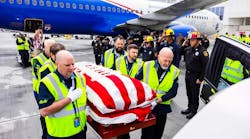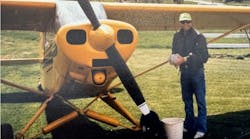Several notable recent developments show that meaningful progress is underway toward the safe integration of small unmanned aircraft systems (sUAS) into the National Airspace System, according to Heidi Williams, NBAA’s director of air traffic services and infrastructure.
In December, President Trump signed into law a national defense bill that also reinstated the mandatory registration requirement for recreational sUAS weighing less than 55 pounds. That requirement had been suspended temporarily by a May 2017 judicial ruling.
"While this reinstatement doesn't affect sUAS flown by NBAA members and other commercial operators under Part 107 or a Section 333 exemption, registration of hobbyist UAS operators will help the FAA gather valuable user data that can be used to help safely integrate manned and unmanned aircraft operations," said Williams.
Also in December, the UAS Identification and Tracking Aviation Rulemaking Committee submitted its report to the FAA regarding available technologies to identify and track UAS in flight. The FAA will now review the recommendations to determine if further action is required before issuing a final rule.
"We're still in the early stages of determining the effects of UAS sharing airspace with manned aircraft, and implementation of a standard tracking process for drones is an important step in that process," said Williams. "NBAA is actively involved in several other UAS rulemaking committees in which industry provides inputs to the FAA on integration of UAS into the national airspace system, both at low altitudes and in controlled airspace above 18,000 feet."
Williams further noted that the first round of participants have submitted their applications to partner with state, local and tribal governments in the U.S. Department of Transportation’s UAS Integrated Pilot Program, which will address specific operational challenges for unmanned aircraft that fall outside the scope of Part 107.
"Each of these 2017 actions addressed specific concerns regarding UAS operations, including their effects upon the business aviation community," Williams concluded. "NBAA will continue to be an active part of this process to ensure the interests and concerns of our members and other UAS stakeholders are properly represented and receive due consideration."
Also, the FAA recently issued guidelines to address concerns about unauthorized drone operations over seven Department of Energy facilities. Learn more about the FAA’s guidelines for drone operations.


